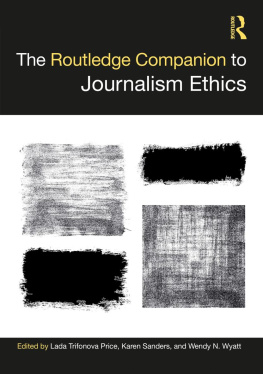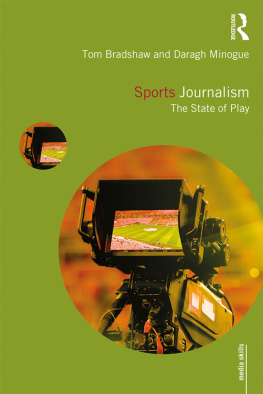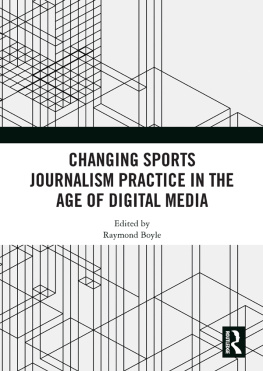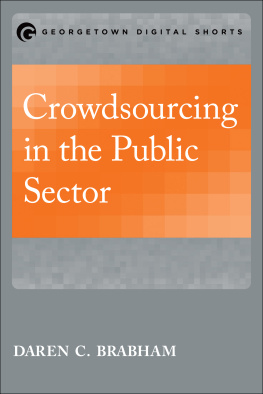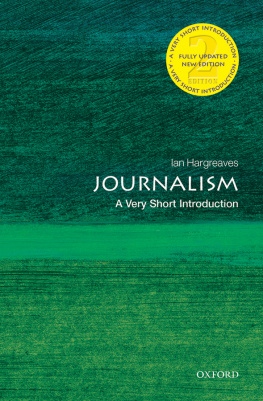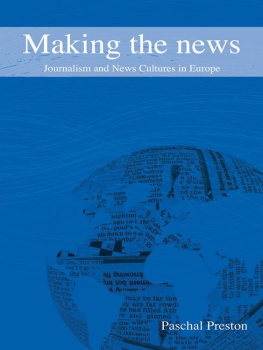
Crowdfunding and Crowdsourcing in Journalism
This book offers an in-depth exploration of crowdfunding and crowdsourcing in journalism today, and examines their impacts on the broader media landscape.
Crowdfunding and Crowdsourcing in Journalism looks at how these practices disrupt traditional journalism models, including shifting journalistic norms, professional identity, and the ethical issues at play when journalists turn to social media and the Internet to solicit widespread support. While there is often a lot of hype and hope invested in these practices, this book takes a critical look at the labour involved in crowdsourcing journalism practices, and the evolving relationship between audiences and journalists, including issues of civility in online spaces. The author draws on in-depth interviews with journalists in Canada and the United States, as well as examples from the United Kingdom, Germany, Sweden, and Australia, to provide a comprehensive study of increasingly important journalist practices.
The book is a valuable resource for academics, researchers, and journalists who are interested in political economy, journalism studies, and labour studies.
Andrea Hunter is an Associate Professor in the Department of Journalism at Concordia University. She is the Director of the Concordia Centre for Broadcasting and Journalism Studies.
Disruptions: Studies in Digital Journalism
Series editor: Bob Franklin
Disruptions refers to the radical changes provoked by the affordances of digital technologies that occur at a pace and on a scale that disrupts settled understandings and traditional ways of creating value, interacting and communicating both socially and professionally. The consequences for digital journalism involve far reaching changes to business models, professional practices, roles, ethics, products and even challenges to the accepted definitions and understandings of journalism. For Digital Journalism Studies, the field of academic inquiry which explores and examines digital journalism, disruption results in paradigmatic and tectonic shifts in scholarly concerns. It prompts reconsideration of research methods, theoretical analyses and responses (oppositional and consensual) to such changes, which have been described as being akin to a moment of mind-blowing uncertainty.
Routledges new book series, Disruptions: Studies in Digital Journalism, seeks to capture, examine and analyse these moments of exciting and explosive professional and scholarly innovation which characterize developments in the day-to-day practice of journalism in an age of digital media, and which are articulated in the newly emerging academic discipline of Digital Journalism Studies.
Crowdfunding and Crowdsourcing in Journalism
Andrea Hunter
Digital Innovations and the Production of Local Content in Community Radio
Josephine F. Coleman
Participatory Journalism in Africa
Hayes Mawindi Mabweazara and Admire Mare
For more information, please visit: www.routledge.com/Disruptions/book-series/DISRUPTDIGJOUR
First published 2021
by Routledge
2 Park Square, Milton Park, Abingdon, Oxon OX14 4RN
and by Routledge
52 Vanderbilt Avenue, New York, NY 10017
Routledge is an imprint of the Taylor & Francis Group, an informa business
2021 Andrea Hunter
The right of Andrea Hunter to be identified as author of this work has been asserted by her in accordance with sections 77 and 78 of the Copyright, Designs and Patents Act 1988.
All rights reserved. No part of this book may be reprinted or reproduced or utilised in any form or by any electronic, mechanical, or other means, now known or hereafter invented, including photocopying and recording, or in any information storage or retrieval system, without permission in writing from the publishers.
Trademark notice: Product or corporate names may be trademarks or registered trademarks, and are used only for identification and explanation without intent to infringe.
British Library Cataloguing-in-Publication Data
A catalogue record for this book is available from the British Library
Library of Congress Cataloging-in-Publication Data
A catalog record has been requested for this book
ISBN: 978-0-367-36068-9 (hbk)
ISBN: 978-0-367-74691-9 (pbk)
ISBN: 978-0-429-34363-6 (ebk)
First, my thanks to the journalists who I interviewed as part of this research. Their insight and experience was vital to the making of this book. I am grateful they took time out of their busy lives to talk to me. The work they are doing is inspiring.
Parts of this book were written through periods of pandemic lockdown that slowed things down at times. My thanks to the editor of this series, Bob Franklin, whose encouragement and support of this project was vital to seeing it through.
Thanks also to Priscille Biehlmann and Jennifer Vennall at Routledge for their guidance.
Finally, thanks to my family for their unwavering support and sense of humour.
Research funding for this project was provided by the Social Sciences and Humanities Research Council of Canada.
The subsection Crowdfunding in Chapter 1 and the sections of Chapter 2 that focus on crowdfunding draw in part on work that first appeared in: Hunter, A. (2016). Its like having a second full-time job: Crowdfunding, journalism and labour. Journalism Practice, 10(2), 217232. Sections of Chapter 3 that focus on crowdfunding first appeared in: Hunter, A. (2015). Crowdfunding independent and freelance journalism: Negotiating journalistic norms of autonomy and objectivity. New Media & Society, 17(2), 272288.
Over five weeks during the spring of 2013, two Dutch journalists, Rob Wijnberg and Ernst Pfauth, raised just over $1.7 million (USD) through crowdfunding. Their goal was to start an independent online journalism platform called De Correspondent, which would offer something different from mainstream media. As Pfauth put it, De Correspondent is a place where readers can find background, analysis, investigative reporting, and the kinds of stories that tend to escape the radar of mainstream media because they do not conform to what is normally understood to be news (Pfauth, , para 1). It was a much smaller amount than De Correspondent, but still significant for Mustafa as it allowed her to offset her freelancing costs and do the kind of in-depth reporting she hoped would be much more impactful than what shed been able to produce before. It would give her the ability to slow down a bit, not worry about quantity, and focus on quality.
[T]o offset the costs for these types of overseas projects, I have to churn out an incredible volume of work. Most of what I produce on these reporting trips is simply for the purpose of paying my way. I end up with very little time to invest in the types of deeper stories that require patient, focused reporting and lots and lots of time the kind of stories that give readers and listeners a better understanding of the reality in the region.
(Mustafa, , para 15)
These are just two examples of a multitude of both small and large crowdfunding ventures that journalists and would-be journalists have undertaken in recent years. As Pfauth and Mustafa did, many of them are taking this on because they want to offer something different than what they see in legacy media. Through crowdfunding, harnessing the power of the Internet to reach potential donors, they are trying to change the landscape of journalism.


